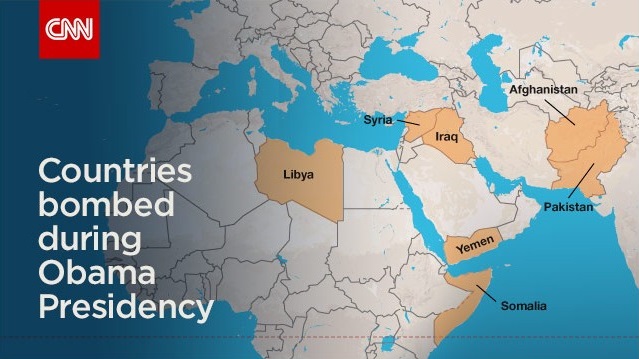The second thing NPR wants you to know about Hillary Clinton and foreign policy—after “she’s experienced”—is “she’s more hawkish than President Obama.” White House correspondent Scott Horsley (All Things Considered, 5/17/16) says:
Clinton is less reticent when it comes to deploying military force than President Obama. While she hasn’t advocated large-scale ground operations, she has pushed for the creation of “safe zones” in Syria, and she was a strong advocate for the US military intervention in Libya.
So Clinton pushed for “safe zones” in Syria, which Obama did not create—and she advocated for US military intervention in Libya, which Obama carried out. So half the evidence presented for the claim that Clinton is more hawkish than Obama actually shows that Clinton is as hawkish as Obama.
But what is the evidence that Obama is “reticent when it comes to deploying military force” in the first place? He’s bombed at least seven countries during his time in office—Iraq, Syria, Afghanistan, Pakistan, Somalia, Yemen and Libya, and drone strikes continue in all of these but Libya. The deadliest airstrikes, those against ISIS-held territory in Iraq and Syria, have killed more than 25,000 people, according to US officials.

CNN graphic showing countries known to have been bombed by Barack Obama.
Obama currently has troops on the ground in at least six countries: Afghanistan, Iraq, Syria, Cameroon, Uganda and Yemen. In his biggest commitment of ground forces, he sent 50,000 troops to Afghanistan, doubling the US presence there. (I say “at least” because Obama has a great enthusiasm for deploying Special Forces, most of whose operations are classified.)

Map from The Atlantic showing Obama’s current military engagements.
To NPR, this level of military intervention is below average for presidents: “If Obama’s caution is, in part, a reaction to the excesses of the George W. Bush era, Clinton’s more aggressive posture might reflect a reversion to the mean.” In other words, Bush was more willing to use force than the average president, Obama was less willing and Clinton, presumably, would be just right. (Clinton wouldn’t “go overboard” because “she paid a political price for backing Bush’s invasion of Iraq in 2003, as well as the Libyan intervention in 2011″—though the political price she paid for Iraq in 2008 didn’t stop her from enthusiastically calling for an attack on Libya.)
Foggy crystal ball–gazing aside, the assertion about Obama’s below-average aggressiveness is dubious. By my count, the younger George Bush engaged in combat in five countries:Afghanistan, Iraq, Pakistan, Yemen and Somalia. Bill Clinton bombed or sent combat troops to six: Iraq, Bosnia, Serbia, Somalia,Afghanistan and Sudan. George Bush the Elder’s military conflicts were in Iraq,Panama, Somalia and Libya. Ronald Reagan took direct military action against Grenada, Libya, Lebanon, Iran and Nicaragua (counting the CIA’sattacks on Nicaraguan ports as direct intervention). Jimmy Carter appears to have launched no military interventions, unless you include the failed hostage rescue mission in Iran.
Gerald Ford presided over the end of the wars against Vietnam, Cambodia and Laos (and sent troops subsequently to Cambodia in a disastrous effort to rescue the Mayaguezhostages). Richard Nixon waged intense war against the three Southeast Asian nations. Lyndon Johnson greatly escalated the war in Vietnam, began bombing in Cambodia and Laos, and also invaded the Dominican Republic. John Kennedy began involving US troops in Vietnamese combat, and attacked Cuba in the Bay of Pigs invasion. Eisenhower ended the Korean War, intervened in Lebanon and sent the first military advisors to Vietnam. Harry Truman presided over the end of World War II—including the atomic bombingof Hiroshima and Nagasaki—and the beginning of the Korean War.
So Barack Obama appears to have engaged in direct combat operations against more foreign nations than any other post–World War II president. (Let me know in a comment if I’ve missed any—history has a way of forgetting the smaller US military operations.) While the combined death tolls of his wars have probably been an order of magnitude or two lower than those of Truman, Johnson, Nixon and Bush junior, his military policy has arguably been more aggressive than Eisenhower’s, Kennedy’s, Ford’s, Carter’s or even Reagan’s (speaking strictly of direct US intervention, not the bloody Reagan Doctrine of fueling proxy wars).
Obama probably out-hawks Bush senior, given that their most intense wars (Desert Stormand ISIS) have similar death tolls, and Obama had more smaller wars; how you rank Bill Clinton depends on whether you count the deadly sanctions regime against Iraq as a part of the ongoing military operation or not.
NPR glosses over all this history, presenting Obama as a relative dove in a way that suggests that its institutional memory doesn’t reach back much before the 21st century. Its presentation of Hillary Clinton as the Goldilocks commander-in-chief—more hawkish than Obama, more dovish than George W. Bush—helps to establish the constant military intervention of the “War on Terror” era as the new normal.
© 2016 Fairness and Accuracy In Reporting (FAIR)

Jim Naureckas is editor of EXTRA! Magazine at FAIR (Fairness & Accuracy In Reporting). He is the co-author of Way Things Aren't: Rush Limbaugh's Reign of Error, and co-editor of The FAIR Reader. He is also the co-manager of FAIR's website.